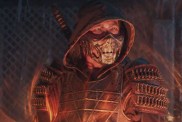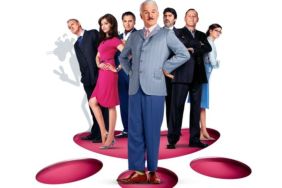
Having a chance to talk to Ricky Gervais was one of the main reasons why we wanted to visit the set of The Invention of Lying, and while he was very busy trying to make his comparatively short day of the shoot, we did get a good amount of time with him to talk about the movie, his award-winning TV shows and his stand-up act. We ended up talking to him in two installments, once on the lawn outside the restaurant as the kids from the neighboring Phillips Academy looked on, and then the second time in a backroom where Ricky was given a throne-like chair to sit on. Even so, we found him to be incredibly humble and honest, which is somewhat amusing since his character in the movie is meant to be the complete opposite.
First… the grass lounging session…
Ricky Gervais: This is where George W. went to school.
ComingSoon.net: No way, really?
Gervais: Yeah, this and Anne Coulter I think. He probably sat here and said, “One day, I’m going to run this country.”
CS: And everyone laughed at him. Matt told us the story about how he was such a huge fan, wrote the script with you in mind, went after you to do it, and now the two of you are directing it together. It’s a pretty amazing story.
Gervais: Yeah, I read the idea, ten pages, and I said, “Oh, I want to do this. I want to co-write it, I want to direct it, and I want to be in it.” Which is so unlike me. He says, “That’s exactly what I had in mind.” I phoned him up to tell him that.
CS: Did you read a script at that time?
Gervais: No, I read about ten pages of what was like a first draft, and I just liked the idea, and then we worked together on it. He flew over to England and we did the second draft and then we did the third draft in L.A. and we’re changing it right up to the wire. It’s a great process. It’s like an arranged marriage. It could have been awful, but I think statistically, they’re better than normal marriages, aren’t they? (laughs) Yeah, so we hit it off, and you’ve seen how we direct. I assume you’ve been around today.
CS: It seems very seamless for two people who haven’t worked together previously.
Gervais: Well, I think it’s the same as the Steve Merchant situation. There’s six billion people in the world, and a few of them are going to see exactly eye to eye with you. He presumed he had the same influences as me, although he says that he had me as an influence, and I didn’t have me as an influence. (laughter) Yeah, it works great, and luckily, he’s nice as well, so we really hit it off, and I’m so proud of it.
CS: Has it been really different working with an American versus working with Stephen who you’ve worked with a long time now?
Gervais: No, not at all. Because, you know, myself and Steven Merchant, all our favorite things are American. We grew up on Laurel and Hardy, the Simpsons is the greatest show. We’re both fans of all those things like Bill Silvers and “Taxi” through “Cheers” and our favorite shows of the moment are “Arrested Development” and “Curb Your Enthusiasm” and we’ve always wanted to do global things. We never wanted to be parochial. “The Office” on the face of it, was very parochial, but the themes were universal and they had a love story that most British sitcoms don’t have and things like that. Our influences are American, our favorite comedy has been coming out of America for the last ten years, and you make the best feature films as well.
CS: Why, thank you.
Gervais: Yeah, I meant you two.
CS: You’ve assembled an amazing cast for this, so did your reputation proceed you there or did you have to work hard to get anyone?
Gervais: No. I think I got most people on board before they read the script, so yeah, I think they were fans of “The Office” or “Extras” or something, and they liked the script. Everyone knew it was my directorial debut, so I think must have done something right in “The Office” or “Extras.” The reason we got all those people on “Extras” was because of “The Office,” everything came from that. Samuel Jackson got “The Office” DVD and it was Kate Winslet’s favorite show. All these people, we read that it was their favorite show and then we thought, “Our cache is as high as it’s ever going to be” and then “Extras” was certainly a critical hit and it sort of added to it. I hope there’s at least a certain quality control in terms of comedy. I think most people are getting less than their normal fee. It’s not a big budget film. It’s not a tiny budget, it’s about 18 and a half million, so we are paying them, but it’s certainly not the cash cow. I hope they are doing it because they like this style of comedy, and it’s been a great experience. I’m already looking back longingly, because it’s the last week. I’m thinking this has been a really great shoot, and you’ll see early we finish. We know what we want. We’re confident with the script ’cause we’ve written it. We’ve been working on it for a year. There’s no surprises. We tweak any little surprises. We just changed a line then that is a callback for something I did earlier in the script, and it works really well when you’ve got the time to do those little bits and pieces. There’s no ridiculous, huge crane shots or CGI. If it was “The Matrix,” I’d panic. I’d probably be here until 7 o’clock but I don’t use shots that I’m not going to put in.
CS: You co-wrote and directed every episode of “The Office” and “Extras” so do you consider this very different from doing the TV shows or is it just the logical extension of that?
Gervais: This is my directorial debut on a feature. I think with comedy, there’s very little difference. I think the less special FX and action-packed and things like that, once they walk through the door and they’ve sat down, it’s directing TV. It’s people talking and saying funny things naturalistically in my opinion, and then you can concentrate on the nuance and the acting and on the performance, as opposed to worrying that you’ve got two takes because a boulder is rolling down a hill after you. (chuckles)
CS: This is a very limited budget for a studio movie, but it’s still a studio movie.
Gervais: No, it’s not a studio movie. It’s fantastic that I’m partnered with a company called MRC that go to financiers, so I co-own the film with MRC. I have a very good reason to get final edit.
CS: So Warners is just the distributor.
Gervais: Exactly. Then we pre-sold the film to Warners and Universal worldwide.

CS: I watched an interview with you from the set of “Ghost Town”…
Gervais: Oh, the “News Night” when I said “I hate the standing around…”
CS: You seemed a little agitated and annoyed with the waiting for them to set the lights.
Gervais: And that was quick. There, we were only doing eleven-hour days there, so I’ve got that down to about nine. (chuckles)
CS: So being in charge has its benefits.
Gervais: It’s the best feeling in the world. Artistically, it’s the only way to be. You have to be in charge. You have to live and die by the sword. If you f*ck up, it’s your fault. If you do well, I can say, “I did that” and that’s why I do it, and that’s the best for me. The creative process is the best, and I think to enjoy the creative process and to get what you want, you have to be a fascist. There’s no room for compromise. There is nothing utilitarian about art, so I’ll do it until I’m rubbish.
CS: With the cast, you’ve created somewhat of a comedy supergroup, because you have Jason Bateman from “Arrested Development,” Jonah Hill from the Apatow group…
Gervais: Jeffrey Tambor, Tina Fey. We have icons like Christopher Guest. And Rob and Jennifer are really funny. I think people are going to realize what funny comic actors they are, so yeah, dare I say it, I think it’s about the best comedy ensemble for a long time.
CS: Matt said you didn’t write any specific characters for anyone but once you had the script, did you think, “Oh, this will be a good part for this person.”
Gervais: Oh, absolutely, of course. I mean, I phoned Rob up and said, “This part is absolutely perfect for you.” And the same with Jennifer, yeah.
CS: What was it about their past work specifically?
Gervais: There’s certain things in the script that we can deconstruct Jennifer Garner’s persona. She’s a person who says “Dangit” and “Darn” and Rob Lowe plays this unfeasibly handsome man who is a go-getter, looking sharp, he’s my nemesis. It’s great to play with that, which I did in “Extras.” You get people to play with their persona. David Bowie is this genius who doesn’t realize that he’s being really offensive because the song is paramount. We play with Ben Stiller, he’s a man who’s into comedy but is really about himself, he’s a megalomaniac. So we love playing with people’s personas.
CS: And everyone’s always into it? No one goes, “I don’t want to come off like that” and no one has ever said “No” to you at this point?
Gervais: Ben Stiller said he was genuinely worried. I think, and I don’t know if he was joking… he told me that he tried to get out because he was really worried, but then he came in and he did I think one of the best comedy TV performances I’ve ever seen. But yeah, he sent me an Email when I sent him the script, he said, “You’ve seen into my soul. We must never speak again.” It was great.
CS: I was really nervous about interviewing him because I was worried he was going to be like the guy he played on “Extras” and be a real jerk.
Gervais: Oh, say that! He’d love that, he’d love that!
CS: But he actually was a really pleasant guy.
Gervais: Of course! Of course! I hope people don’t think Kate Winslet is really like that then. (laughs)
CS: I personally loved Patrick Stewart with the nudity.
Gervais: Aw, man! I’ve watched that again on YouTube, I must admit. I have gone and watched that scene again. It’s perfect. It’s the way he does it that I’ve seen it all.

Ricky was then pulled away to work so we didn’t get to finish the interview until a couple hours later, but it was in a more relaxed setting, because they had wrapped shooting for the day, and the Inn had found Ricky a throne of sorts to conduct the second part of our interview.
Gervais: I feel like a Boticelli painting sitting in this.
CS: I think they got a nice shot of you laying in the grass, so maybe that will end up somewhere.
Gervais: It’s like we’re having a little picnic.
CS: I wanted to ask you about the blogging on your site. Do you find it tough to produce stuff for the site on a daily basis or do you find it cathartic?
Gervais: Well, it’s both, because I enjoy doing it, and it’s funny, and if I have something funny to say, that’s nice, and it keeps the old brain active, ’cause I have to go to bed about nine o’clock, but then I’ve got that thing that, “Oh, I must have missed a day.” I only need one person to go there and go, “Oh, he hasn’t done anything today” so I try and keep it different. I don’t want it to be a real director’s blog, because honestly, they’re boring. No one wants to know how I decide to change a line. No one wants to see war stories about how we won the day. No one wants to read about lenses, so I write about things that go wrong or how the studio are nervous that I’m a charlatan or me going to New York to annoy my friends, so I try and keep it everything but the actual filmmaking process.
CS: There is a lot about that jet you’ve been given. You’re giving that back, right?
Gervais: I’d love to keep it. I’m not going to do a normal flight again. Even First Class British Airways is going to be beneath me now. It’s so funny, because as you know, MRC, the company that I’m partnering with to do this, they said, “Oh, you can have a jet weekends to get to New York” and I said, “I won’t use that” and then I used it once, and it’s incredible, because there’s no fuss. You jump on, they drop you off and you’re in New York, so I’m a big fan. I’m a big fan. I asked them how much it cost to buy the jet and it’s ten million to buy it. The pilot said, “So it’s 2.5 for 4 share” so I think the pilots own it, I think that’s what they’ve done. It’s like being a cab driver but faster… so I’ll probably go in with John Travolta. He’s already got two, and his are much bigger. It’s ridiculous, because I think of me going on a private jet, and the first time I went up, they thought I was the chef, that’s true. The pilot went, “Hi, someone told me the chef had arrived” ’cause I’m always dressed like this. The only person in the airport. Good.
CS: The premise is pretty straightforward but there seems to be a bigger world out there and things going on outside what we see you through going through. Is that stuff that you and Matt worked out for the future? Or is it just there and you just don’t show it in the movie?
Gervais: Do you mean have we got a backstory for it or are we aware of it in case…? What’s the rest of the world like? You’d extrapolate it, so if you go to England, the British people are doing the same things, and they’d be telling the truth. Yeah, it’s one of those things that you want to be strict, because you need everything to have an internal logic, and you want to answer every question or at least you want to be able to answer every question. But then, for example, you let some things go, because it would be too restrictive, it would get in the way of comedy. We have to have a little bit of private license. Let’s face it. It’s a house of cards that would all come crumbling down, so you have to get the premise and let that be a vehicle for the real comedy and drama, which is a very funny romantic comedy about normal people, that’s the honest truth. The high concept thing is a Trojan Horse for all that. It gets it going, just like everyone acted normally in “Groundhog Day.” Just like everybody acted normally in “Back to the Future.” Once you get over the high concept, you should be watching a normal, funny drama.
CS: It’s kind of hard to envision just having seen that one scene you’ve been doing today.
Gervais: Well, yeah, the thing that we’ve picked on for comic value is this strange sort of truettes, that people have to say the honest truth and it looks harsh, but it’s not. It’s the way of the world, but there’s still hope and there’s still poverty, and there’s people wishing they had more money ’cause they could buy nice things and there’s people that are stealing but then going, “I stole it.” That’s why you can play with it.
CS: We heard that Jonah Hill is a bigger loser than your character.
Gervais: He’s sort of like a suicidal manic depressive young guy that lives in my apartment building, and that’s very sweet, ’cause I sort of save him. Also, in this, we look at (the fact that) there are good and bad liars, just like there are in life. Not all lying is wrong. Sometimes it comes down to politeness. “Do I look fat in this?” “No, you don’t.” “Do you think the doctors did a good job on my scar?” “Yes, they did?” Do you know what I mean? There are some things you have to be an awful sh*t to say “No, it looks awful. You look like a freak.” We deal with that, and we say that without lies, there would be no fiction, which would be a terrible world. There’d be no passion, in a way, cause there’d be no reference point. No charm.
CS: Jennifer said that for the whole movie she just says horrible things to you.
Gervais: I always write parts for myself that really beat myself up. That was actually a scene that I wrote over the phone, because Jennifer had asked if she could have one more funny scene in the end and we wrote that especially, but I remember doing that over the phone, the scene, but it mirrors the thing that we have where she’s just brutally honest to me. My mum calls and she goes, “No, he’s not really good looking, no he does not have much money,” and I was giving her lines, “Say he looks like a frog.” But that’s funny. I like that. I laugh. I love it. It’s hilarious. It makes me laugh when someone is brutally honest. Because in real life, if someone’s nasty to someone, the person who’s nasty is the winner ’cause they haven’t been nasty, and I like the idea of that. Old people say it, they go, “Oh, you look awful” and you laugh. You let them off ’cause they’ve got these old people’s rights. It doesn’t bother me. The day I start writing parts where someone says, “My God, you’re tall,” then I’m over, then I’m finished.

CS: Rob said that a world of lies is easier, so after spending more than a year on this, is a world without lies better? Matt said that there might still be wars, but they’d be different kinds of wars.
Gervais: Well, there’d be no wars based on prejudice. We’ve sort of avoided things like that. When we were thinking of the films that they’d make, we were avoiding things that were built on anything (dealing with) race because it wouldn’t be an issue.
CS: So in theory, this could be a better world.
Gervais: Well, it could be better if you could have a world without fiction and fortunately, we’ve made it that not everyone is nice and honest. We’ve made it that people’s feelings are hurt because they wished they weren’t like that. Even though you accept that it’s true, when somebody says you’re a loser and you’ll never be good, you go, “It’s true.” You’re obviously upset by it. You don’t go, “Yeah, I am!” Just because it’s true, that doesn’t make it okay, so poor people are still depressed.
CS: In this world, there’s somewhat of a master race in terms of those with perfect genes, and yet, you’re kind of like Superman, you’re coming in and fixing the problems.
Gervais: Yeah, I’m saying that it’s not all about that, and I cheated slightly and there’s always something about me. Even when everyone’s having this truettes-like honesty, I’ve still got a little bit of sarcasm. Like when somebody says to me, “You’re a loser,” I go, “Sure.” There’s a little hint of normal world and then we just sneak Anna into being a bit normal, so we see there’s a reason. We move it slightly. We dolly in on emotion.
CS: That’s a director’s term. Very good.
Gervais: Yeah
but I used it as a metaphor. (laughs)
CS: Rob mentioned that in this world, all of the movies are documentaries, so are you actually going to try to make some of those films? Either for the DVD or something we might see as part of the movie?
Gervais: We’ve made a few little things. Christopher Guest plays one of the readers of the day, who is the funniest man. It’s all very straight and real but the fact that it’s real and banal is the funny bit. There’s one with Christopher Guest and he’s talking about numbers. “Science is mathematics and there are numbers like 1
2
3” and then he goes “My favorite number is 777. It’s the 7’s I like.”
CS: And that’s the “Spider-Man” of this world, like the biggest blockbuster.
Gervais: Exactly, right, right.
CS: Any plans to go back to TV any time soon?
Gervais: No, I haven’t stopped TV, I haven’t left TV behind. It just so happens that all my TV happened in one bulk, and now all my films happened in one bulk. I went straight from “The Office” to “Extras,” turning down movies, but then I went straight from “Ghost Town” to this and I’ve just written a screenplay with Steve Merchant for the third film, so I will do three films in a row now. But that’s just by chance.
CS: You mentioned “Ghost Town” and the director David Koepp has mainly done dark thrillers, and you wouldn’t really think of him as someone who’d have room for comedy as far as the movies he’s directed.
Gervais: Well, I loved the script, I laughed out loud. It was the funniest script I’d ever read up until that point. He said it was for me, which was nice. I’m sure he’s lying. I read it and thought, “This is for me, it’s definitely for me.” Then we collaborated. He came over and we worked on it and we really customized it to me, and it’s really sweet. It’s what I was saying I want this to be. It’s a really nice grown-up film. There’s no lame jokes, there’s no jokes aimed at fourteen year old frat kids, it’s not toilet humor. It’s up there with “The Apartment” or “It’s a Wonderful Life.” It’s not a vehicle for anyone. It’s really sweet and classy, I’m really proud of it. It’s really moving.
CS: How come you haven’t recorded full length versions of all the David Brent songs?
Gervais: Because that would make me like David Brent. I see these people who get a bit of attention on something, and the first thing they do is release it, and it doesn’t count. It doesn’t make them a pop star. It’s like merchandising, it’s like cashing in on something, and it just leaves a horrible taste in my mouth. We’re very careful at “The Office,” and it was the sort of thing we’d take the piss out of in “The Office.” For me to then do it, I think is breaking my own rules, really, but if I ever did “The Office” again, which I’m sure I won’t, maybe I’ll have a section where he does release an album… within “The Office.” It’s just that I don’t want to go outside “The Office,” that’s what I don’t want. I don’t want to see a fictional character on MTV. When I first saw “Do the Bartman,” I thought that’s a terrible show, then it took me two years to sit down and watch an episode of “The Simpsons” and realize it was the greatest show ever, because I was put off by that. So I just think it has to exist in its own world. I could have done it and I just think, “There’s enough tat in the world” and I was trying to bring a bit of class with “The Office” and I don’t want to ruin it, because we left it there. But I did enjoy doing it. I really enjoyed playing there, and we did do a little thing for the DVD as well when Noel Gallagher played. But if you actually released it, that’s going one step too far.
CS: I saw the Highline benefit show you did at the Theatre at Madison Square Garden last year with David Bowie introducing you. When you come around again, are all the stories you’ve had making the movie going to end up in your act? Do you know exactly what you’re going to do for this series of shows?
Gervais: It’s a worry about putting (a show) to media, because no one wants to hear about my wonderful life, so I have to get back to my roots. Most of my anecdotes are the stress of being famous and people going, “Oy, you fat bastard” or going back to childhood. It’s difficult to come out and go–I do it ironically–but it’s quite dangerous ’cause I’ve seen some people and they’ve forgotten… They go, “You know what it’s like when you’re on a private jet…” and people go, “No, we still take the bus.” I think you’ve gotta remember that… the other thing is this. There’s nothing about watching rich, successful people show off. There’s nothing funny about that. I’ve sort of made my living being a loser.
CS: On “Extras,” a lot of that was about seeing successful people showing up and playing up that part of their lives.
Gervais: Exactly, but they usually get their comeuppance or you don’t like them. If Andy Millman was a really successful actor, you can’t like him as much than if he was struggling with Maggie, which is why in the Christmas Special, when he got real success, it turned his head. I think you need that underdog, making it, happy for him, becomes an *sshole, hate him, he redeems himself. Whereas you don’t have time to do that in standup. You only have one hour. I have to tell stories, but you can’t tell stories about how you outwitted the world. If a comedian comes out and goes “I was with this woman…” and you sort of laugh but you think, “I don’t like you.” I’d rather someone come out there and stumble and go “I’m an idiot.” Then I love them. Imagine if Laurel and Hardy were cool. F*ck you.
CS: With “Extras” and “The Office,” you had your arc over two seasons, was it hard writing to compress it into that amount of time?
Gervais: No, no, it wasn’t, because it meant that it was packed, it was absolutely packed. There was no filler, it wasn’t watered down, they didn’t get sick of it, we didn’t repeat ourselves. I didn’t do it to stay around forever doing that character or milk it, I did it ’cause I had a story to tell and I wanted to get in and out. Because it is a tale with a moral, it went ballistic worldwide. It’s a franchise. It’s been shown in ninety countries, the original format, there’s got a remake in America, France, Canada, Germany, Chile… it couldn’t have been bigger. By me stopping, it’s bigger than it would have ever been.









